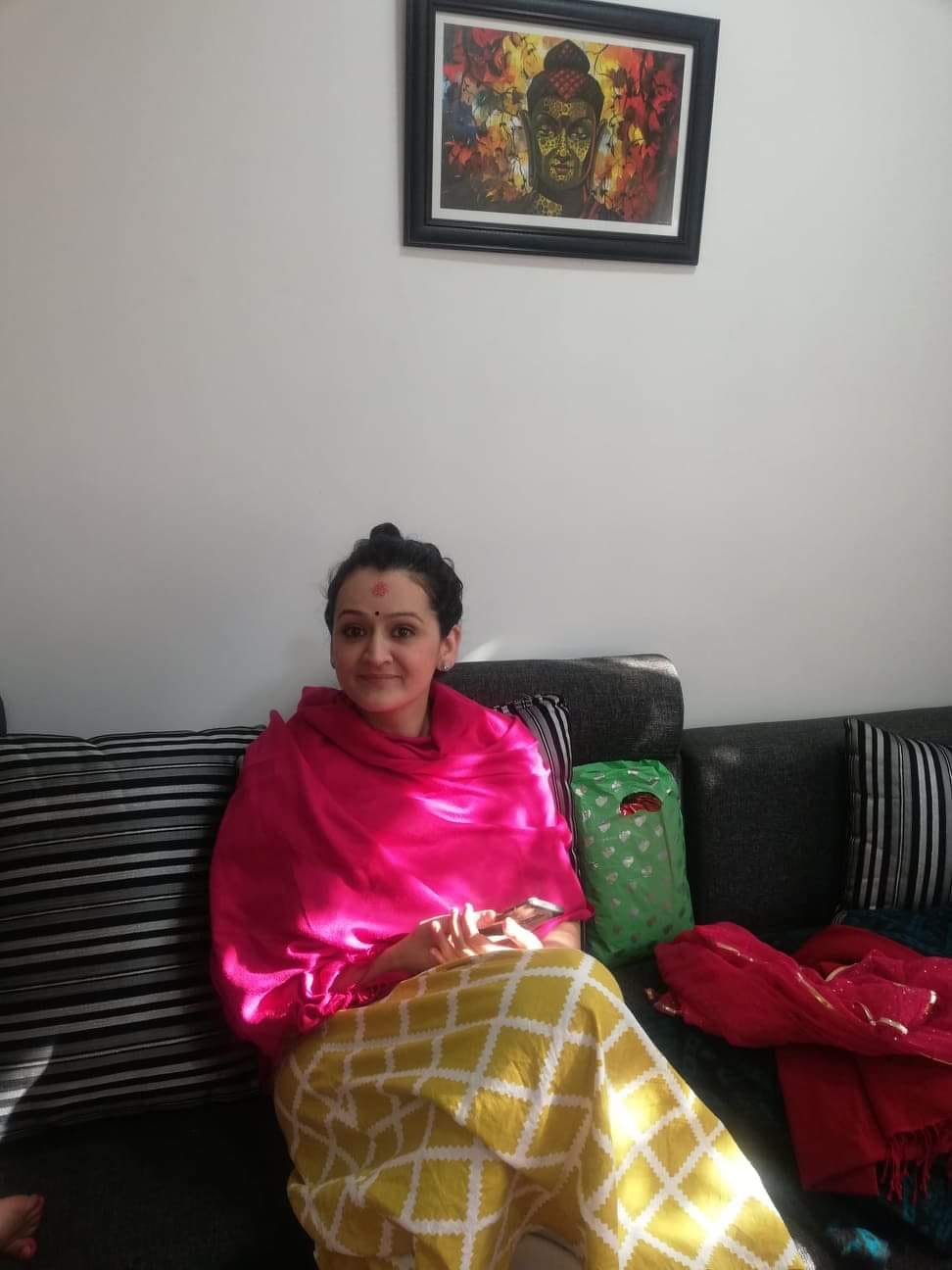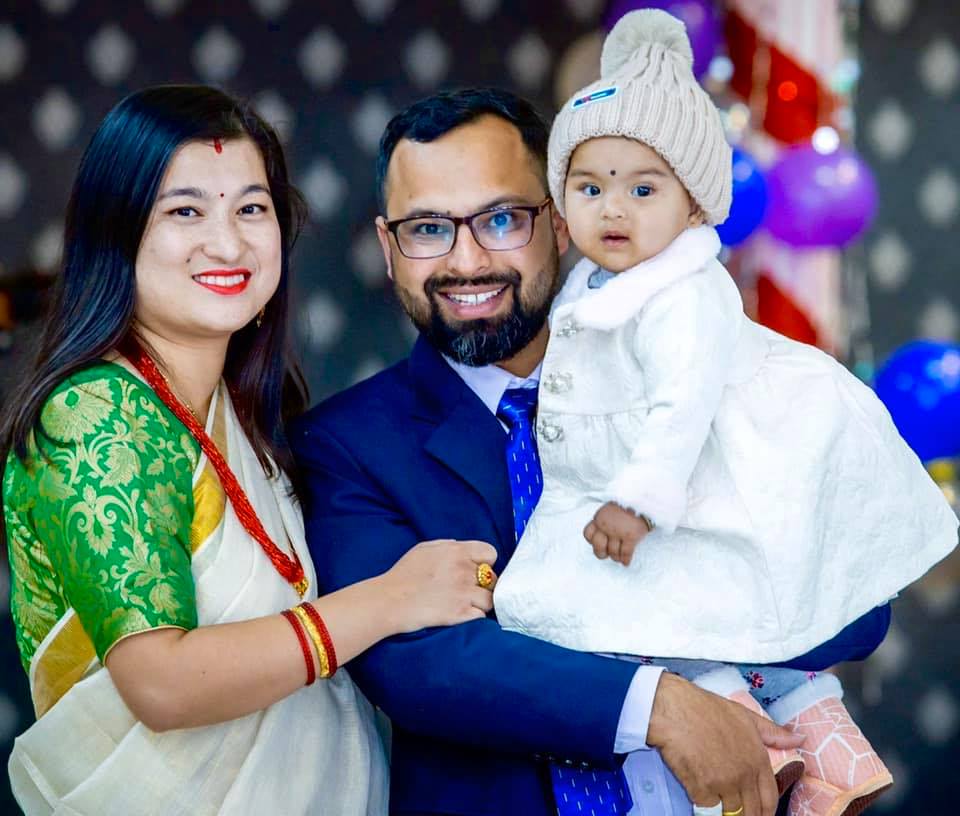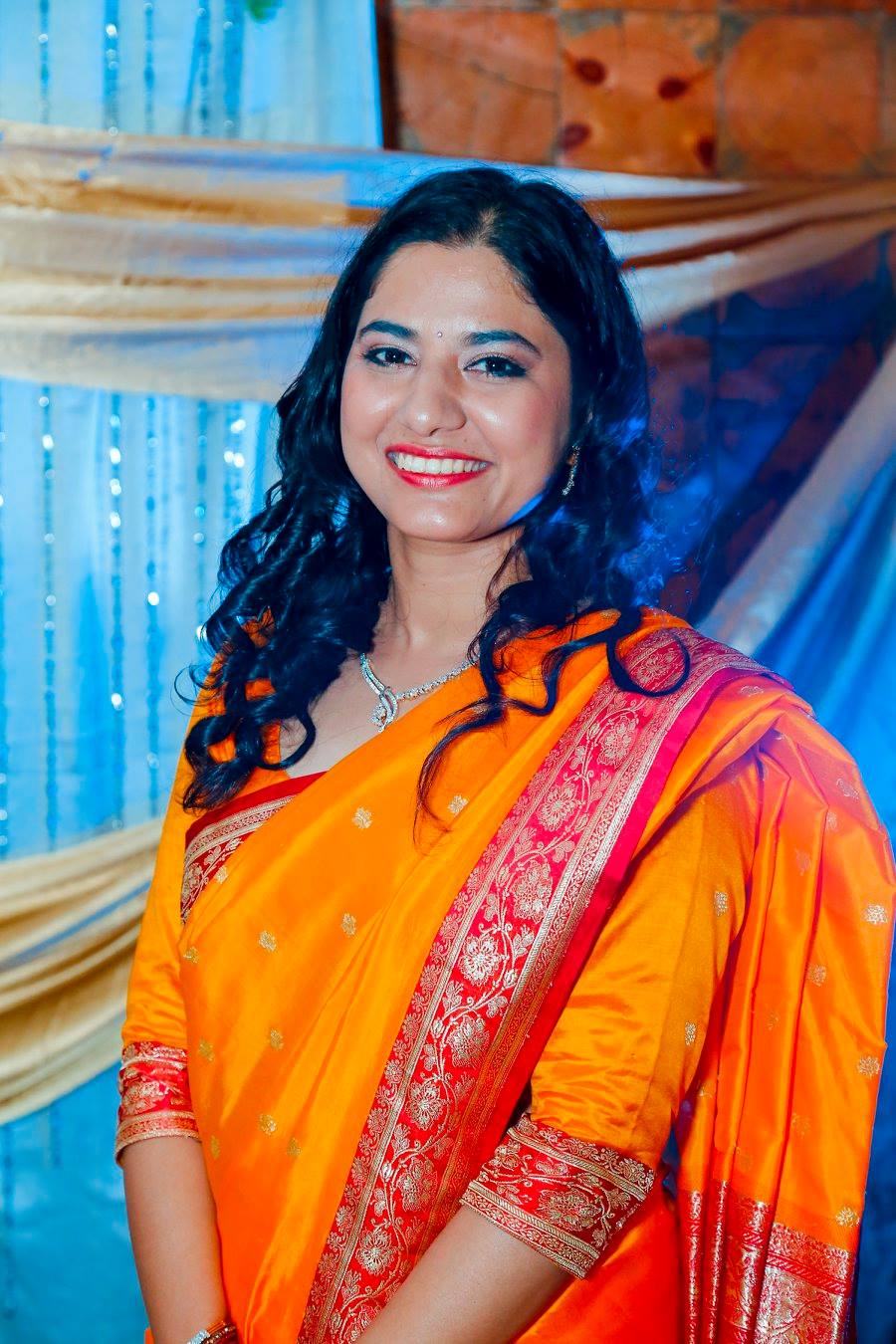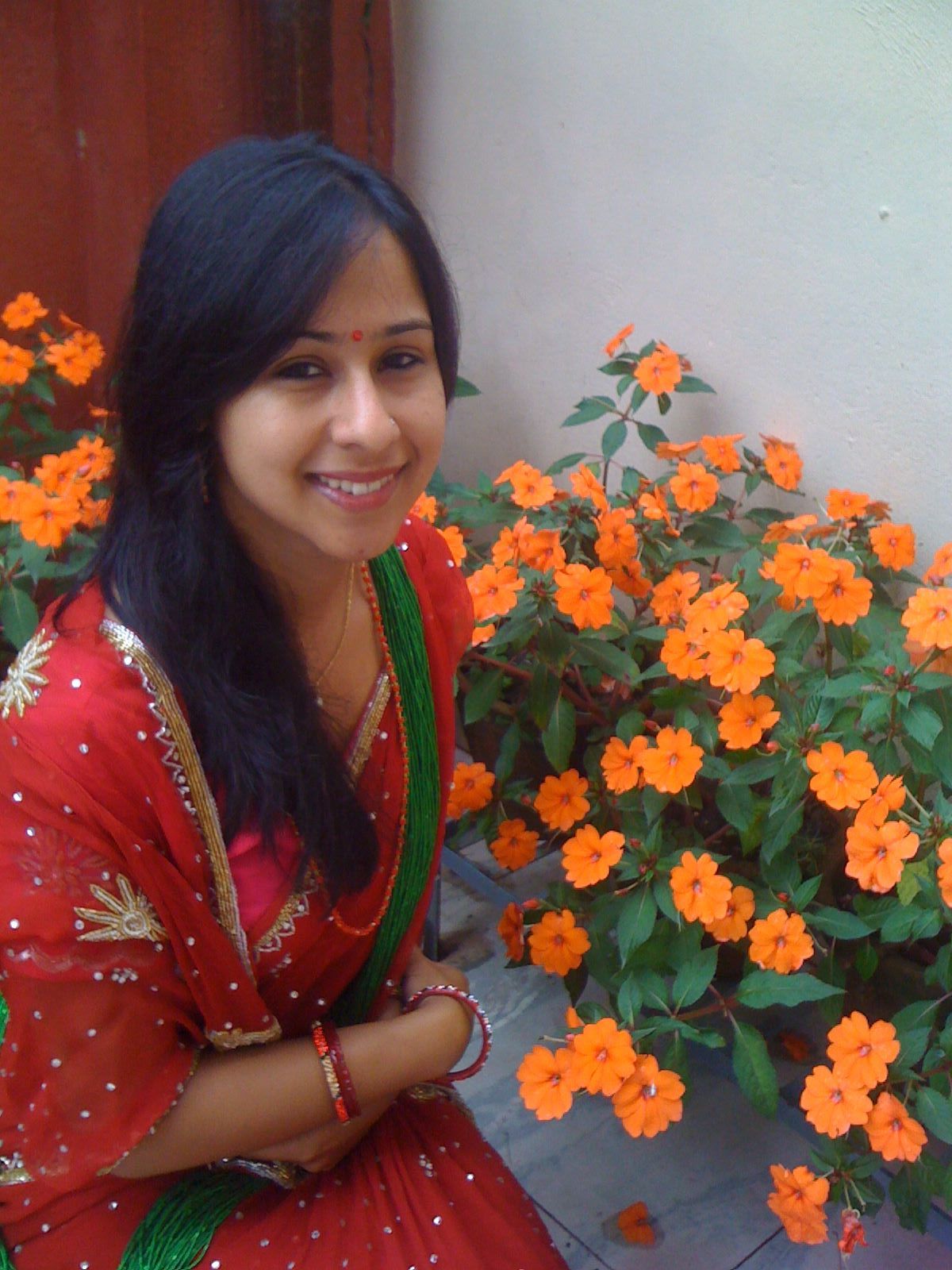Shriya Pant, program management consultant at UNFPA, puts Dashain tika even when she’s on her period. She goes to the puja kotha and visits temples too. It wasn’t always like that though. While growing up, she, like most Nepali women, didn’t enter places of worship during her period.
 Shriya Pant
“It’s just not right for women to be discriminated against because of a bodily function. These are harmful practices that we, as a society, need to do away with. I don’t follow them anymore,” she says.
Ever since she got married four years ago, Poonam Maharjan, a homemaker and fulltime mother, hasn’t restricted herself from visiting temples, going to the puja kotha, or participating in religious functions while on her period. Last year, she had her period on Laxmi puja in Tihar. That, she says, didn’t stop her from doing the puja herself.
Shriya Pant
“It’s just not right for women to be discriminated against because of a bodily function. These are harmful practices that we, as a society, need to do away with. I don’t follow them anymore,” she says.
Ever since she got married four years ago, Poonam Maharjan, a homemaker and fulltime mother, hasn’t restricted herself from visiting temples, going to the puja kotha, or participating in religious functions while on her period. Last year, she had her period on Laxmi puja in Tihar. That, she says, didn’t stop her from doing the puja herself.
 Poonam Maharjan with her husband Suman Lamichhane and daughter Joon
“The good thing is my husband fully supports this despite his belonging to a Brahmin family that practices strict menstrual rituals,” she says.
Her husband, Suman Lamichhane, says these rituals might have made some sense in the bygone days when women didn’t have the means to manage their periods properly. But now, with so many options and greater awareness, it serves no purpose.
“My wife doesn’t follow these rituals but we still seem to be in God’s good books and have a happy home,” he adds.
Poonam doesn’t see the need to make her periods public, which is what refraining from certain activities—like not going to the kitchen, not worshipping gods, etc.—does. Menstruation, for her, is already as inconvenient as it can get without further complicating it with societal and cultural constraints.
Nothing religious about it
According to historian Sujit Mainali, it’s not just Hindus who have menstrual rituals and taboos. There are some old tribal religions that practice it as well. Apart from the indigenous communities of Nepal and the Sikhs, most cultures follow some form of menstrual customs.
Mainali says there are two school of thoughts behind the age-old practices of menstrual taboos. First, the restrictions on women during menstruation supposedly ensured they got adequate rest, time to nourish their bodies, and paid attention to their hygiene. It was meant for a woman’s overall well-being.
“But this doesn’t make much sense. On one hand, you are saying it’s to make sure she’s in good health while on the other hand, you put her under several dietary restrictions and make her stay in a dark place,” says Mainali.
The second, more plausible reason is that menstruation indicated a woman’s reproductive status to her family and the community. This proved helpful in monitoring women’s sexual activities and thus prevented pre-marital sex and adultery.
Hence, from a sociological and anthropological viewpoint, the taboos were largely meant to contain, suppress, and dominate women.
“The reason they are there in our dharma shastras is to guarantee that women will follow these rules,” explains Mainali, adding that he has found no mention of any menstrual rituals in earlier Hindu religious texts but then there are some references to it in the Manusmriti.
Most women APEX spoke to said menstrual taboos were annoying and unnecessary. But most of them also confessed they couldn’t bring themselves to completely disregard them. The reason? They didn’t want to go against their family’s faith and tradition, feared hurting their mother’s feelings, and, for others, habits were difficult to break.
Amshu Dali, MD at Prakriti Bread, says she doesn’t enter the puja kotha and participate in pujas when on her period but that is because her family is religious and thus of a certain faith. Personally, she doesn’t see the logic behind the culture but follows it nonetheless to make her mother happy.
Poonam Maharjan with her husband Suman Lamichhane and daughter Joon
“The good thing is my husband fully supports this despite his belonging to a Brahmin family that practices strict menstrual rituals,” she says.
Her husband, Suman Lamichhane, says these rituals might have made some sense in the bygone days when women didn’t have the means to manage their periods properly. But now, with so many options and greater awareness, it serves no purpose.
“My wife doesn’t follow these rituals but we still seem to be in God’s good books and have a happy home,” he adds.
Poonam doesn’t see the need to make her periods public, which is what refraining from certain activities—like not going to the kitchen, not worshipping gods, etc.—does. Menstruation, for her, is already as inconvenient as it can get without further complicating it with societal and cultural constraints.
Nothing religious about it
According to historian Sujit Mainali, it’s not just Hindus who have menstrual rituals and taboos. There are some old tribal religions that practice it as well. Apart from the indigenous communities of Nepal and the Sikhs, most cultures follow some form of menstrual customs.
Mainali says there are two school of thoughts behind the age-old practices of menstrual taboos. First, the restrictions on women during menstruation supposedly ensured they got adequate rest, time to nourish their bodies, and paid attention to their hygiene. It was meant for a woman’s overall well-being.
“But this doesn’t make much sense. On one hand, you are saying it’s to make sure she’s in good health while on the other hand, you put her under several dietary restrictions and make her stay in a dark place,” says Mainali.
The second, more plausible reason is that menstruation indicated a woman’s reproductive status to her family and the community. This proved helpful in monitoring women’s sexual activities and thus prevented pre-marital sex and adultery.
Hence, from a sociological and anthropological viewpoint, the taboos were largely meant to contain, suppress, and dominate women.
“The reason they are there in our dharma shastras is to guarantee that women will follow these rules,” explains Mainali, adding that he has found no mention of any menstrual rituals in earlier Hindu religious texts but then there are some references to it in the Manusmriti.
Most women APEX spoke to said menstrual taboos were annoying and unnecessary. But most of them also confessed they couldn’t bring themselves to completely disregard them. The reason? They didn’t want to go against their family’s faith and tradition, feared hurting their mother’s feelings, and, for others, habits were difficult to break.
Amshu Dali, MD at Prakriti Bread, says she doesn’t enter the puja kotha and participate in pujas when on her period but that is because her family is religious and thus of a certain faith. Personally, she doesn’t see the logic behind the culture but follows it nonetheless to make her mother happy.
 Amshu Dali
Likewise, Shruti Dhungel, who works in the development sector, says she follows menstrual rituals but only when her mother is around. At home, with her husband, she couldn’t care less about touching the gods or doing whatever it is that her mother always told her she shouldn’t while on her period.
Amshu Dali
Likewise, Shruti Dhungel, who works in the development sector, says she follows menstrual rituals but only when her mother is around. At home, with her husband, she couldn’t care less about touching the gods or doing whatever it is that her mother always told her she shouldn’t while on her period.
 Shruti Dhungel
“I can’t suddenly expect my mother to accept ways that are in complete contrast to hers,” says Shruti. Her mother, she says, has also evolved a lot over the years and isn’t as stringent as she once was. She adds change is a gradual process and it can’t (and shouldn’t) be forced or rushed.
Ingrained habits
Dr Shreyashi Aryal, assistant professor, Obstetrics and Gynecology, at Lumbini Medical College Teaching Hospital, says certain things are engrained in her mind and behavior after years of conditioning. She still finds herself repeating those actions every time she has her menses.
Shruti Dhungel
“I can’t suddenly expect my mother to accept ways that are in complete contrast to hers,” says Shruti. Her mother, she says, has also evolved a lot over the years and isn’t as stringent as she once was. She adds change is a gradual process and it can’t (and shouldn’t) be forced or rushed.
Ingrained habits
Dr Shreyashi Aryal, assistant professor, Obstetrics and Gynecology, at Lumbini Medical College Teaching Hospital, says certain things are engrained in her mind and behavior after years of conditioning. She still finds herself repeating those actions every time she has her menses.
 Shreyashi Aryal
Shreyashi was brought up in a strict Brahmin family and thus wasn’t allowed to do many things during her menses, which included entering the kitchen and touching fruit trees and her father.
“As I grew up, I understood all that wasn’t necessary but I didn’t rebel out of respect for my family norms,” she says. However, she adds that she won’t dictate what her daughter does or doesn’t do when she gets her periods. Instead, she will tell her that menstruation is purely physiological and that menstrual blood isn’t “impure”.
“I will see to it that she understands the religious, cultural, and scientific aspects of menstruation. What she chooses to do with the information will be entirely up to her,” she adds echoing Poonam’s sentiments.
However, Poonam says that apart from teaching her the basics of menstruation and its management, she will also teach Joon, her daughter, to challenge the culture that dictates she has to participate in a certain puja to seek forgiveness for menstruating.
Dr Neeti Aryal Khanal, lecturer of sociology, Tribhuvan University, says women have, for far too long, adopted a non-questioning attitude. It doesn’t help that they have to constantly negotiate their position and status in the society. In such a case, menstruation puts forth a social and moral dilemma.
For many, Dr Neeti argues, navigating social norms poses a constant challenge. She says women want to do what they want and keep their families happy, which are two, often mutually exclusive, goals.
“I’m against practices that regard menstruation as impure. This is where creation begins. But I can see why most women still follow these rituals,” she says. Forget rural women, Dr Neeti says, even urban women have many obligations that bind them. On a subconsciously level too, women try to avoid conflicts within the family.
Why hush-hush?
What’s worse, Amshu says, is that instead of embracing womanhood, we are taught to hide and be embarrassed about getting our periods.
And indeed, menstruation has always been a hushed affair. From the shopkeeper discreetly wrapping a packet of sanitary pads in newspaper to girls tying sweaters around their waists to hide the most miniscule of stains, the society seems to have made it clear that it’s something to be ashamed of.
Satya Prakash Dhungana, a pranacharya, says even our dharma shastras don’t regard menstruation as something unclean.
“It does recommend that women keep themselves physically clean during their time of the month, but it isn’t considered unholy,” he says.
Dhungana stresses on the need to be practical and not make pointless rules in the name of religion. He adds that women can do what they are comfortable with—what their heart allows them to do free of guilt.
Dr Neeti feels the same way. You shouldn’t change for the sake of change, or because your friends think menstrual rituals are nonsensical. But neither can you give continuity to something that you feel is unnecessary for the sake of the society. But, most important, you shouldn’t judge others for their choices because, as Dr Neeti puts it, this is tricky course to navigate.
“So, what do you do? You do exactly what you feel is right, what your conscience permits you to do,” she concludes.
Shreyashi Aryal
Shreyashi was brought up in a strict Brahmin family and thus wasn’t allowed to do many things during her menses, which included entering the kitchen and touching fruit trees and her father.
“As I grew up, I understood all that wasn’t necessary but I didn’t rebel out of respect for my family norms,” she says. However, she adds that she won’t dictate what her daughter does or doesn’t do when she gets her periods. Instead, she will tell her that menstruation is purely physiological and that menstrual blood isn’t “impure”.
“I will see to it that she understands the religious, cultural, and scientific aspects of menstruation. What she chooses to do with the information will be entirely up to her,” she adds echoing Poonam’s sentiments.
However, Poonam says that apart from teaching her the basics of menstruation and its management, she will also teach Joon, her daughter, to challenge the culture that dictates she has to participate in a certain puja to seek forgiveness for menstruating.
Dr Neeti Aryal Khanal, lecturer of sociology, Tribhuvan University, says women have, for far too long, adopted a non-questioning attitude. It doesn’t help that they have to constantly negotiate their position and status in the society. In such a case, menstruation puts forth a social and moral dilemma.
For many, Dr Neeti argues, navigating social norms poses a constant challenge. She says women want to do what they want and keep their families happy, which are two, often mutually exclusive, goals.
“I’m against practices that regard menstruation as impure. This is where creation begins. But I can see why most women still follow these rituals,” she says. Forget rural women, Dr Neeti says, even urban women have many obligations that bind them. On a subconsciously level too, women try to avoid conflicts within the family.
Why hush-hush?
What’s worse, Amshu says, is that instead of embracing womanhood, we are taught to hide and be embarrassed about getting our periods.
And indeed, menstruation has always been a hushed affair. From the shopkeeper discreetly wrapping a packet of sanitary pads in newspaper to girls tying sweaters around their waists to hide the most miniscule of stains, the society seems to have made it clear that it’s something to be ashamed of.
Satya Prakash Dhungana, a pranacharya, says even our dharma shastras don’t regard menstruation as something unclean.
“It does recommend that women keep themselves physically clean during their time of the month, but it isn’t considered unholy,” he says.
Dhungana stresses on the need to be practical and not make pointless rules in the name of religion. He adds that women can do what they are comfortable with—what their heart allows them to do free of guilt.
Dr Neeti feels the same way. You shouldn’t change for the sake of change, or because your friends think menstrual rituals are nonsensical. But neither can you give continuity to something that you feel is unnecessary for the sake of the society. But, most important, you shouldn’t judge others for their choices because, as Dr Neeti puts it, this is tricky course to navigate.
“So, what do you do? You do exactly what you feel is right, what your conscience permits you to do,” she concludes.











